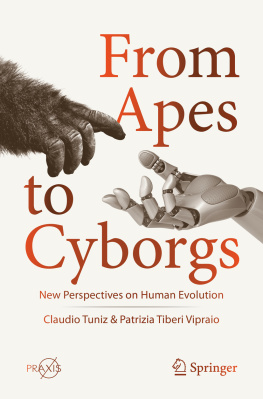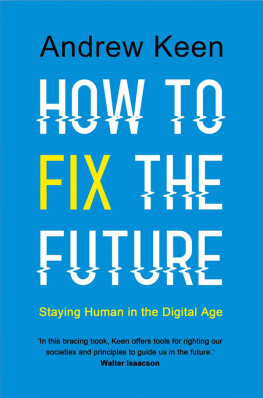
This work is engaged in future studies in a very original and genuine way. It shows in particular how the articulation of knowledge needed for a deeper understanding of the phenomenon of the future is still much ignored within the scientific circles.
Rolande Borrelly, Prsidente, Institut des sciences mathmatiques et conomiques appliques, Paris
This book is a major collection of some critical essays on recent technological innovations such as energy technologies, nanotechnology, 3D printing, robotics, AI, space exploration. It brings to light many uncertainties in innovation processes and their evolving future impacts.
Andrzej Cichocki, Professor artificial intelligence and biomedical applications, Skolkovo Institute of Science of Technology, Moscow
The book is an essential reading for anyone interested in understanding the future courses of human societies, especially the debates concerning technological evolutions and their long-term outcomes.
Enzo Di Fabrizio, Professor in physical science, King Abdullah University of Science and Technology, Saudi Arabia
This insightful book explores the far-off future interdisciplinarilly covering social sciences and natural sciences. Its broad and diverse approaches open a horizon to new areas of future studies.
Jin K. Lee, President, Korea Social Science Research Council, Seoul
This timely and thought-provoking volume provides a convenient map for a journey into the future where technology should not, and cannot, arrive alone without its eternal companions of social science, humanities, art, law and ethics. This is a must read for students, teachers and members of the general public alike who are enthusiastic time travelers and invested in the future.
Steven K. Wisensale, Professor of public policy, University of Connecticut, USA
Future Courses of Human Societies
The future as a field of inquiry, debate or forecasts continues to flourish. However, this book differs from existing literature in several important ways. It is not another publication on future scenarios guided by a linear technological fix nor is it simply a volume of new statistics on economic, demographic or geopolitical developments. Rather, Future Courses of Human Societies explores and builds a general framework for understanding the long-term evolution of human societies.
Drawing upon a wide range of insights from across the social and natural sciences, the authors of this title present original, exploratory methodological and analytical approaches to examining the future. With the aim of deepening knowledge and encouraging critical thinking, three themes are considered in their complexity and multi-dimensionality: technological innovations; economic progress; and the critical aspect of organizing collective life in the future. Furthermore, in contrast to previous studies that have embraced a relatively short time span, this book incorporates perspectives from the immediate to the distant future, extending to several centuries and even millennia.
An interdisciplinary and internationally comprehensive volume, Future Courses of Human Societies is a key source for students and researchers interested in fields such as future studies, technology in society, interdisciplinary learnings on social and natural sciences and future economic and political evolutions.
Klber Ghimire is a professor at the International College of Arts, Yokohama City University, Japan.
Routledge Studies in Science, Technology and Society
For a full list of titles in this series, please visit: https://www.routledge.com/Routledge-Studies-in-Science-Technology-and-Society/book-series/SE0054
30 Digitizing Identities
Doing Identity in a Networked World
Edited by Irma van der Ploeg and Jason Pridmore
31 The Globalization of American Infrastructure
The Shipping Container and Freight Transportation
Matthew Heins
32 Science, Risk, and Policy
Andrew J. Knight
33 The Ethics of Ordinary Technology
Michel Puech
34 Imagined Futures in Science, Technology and Society
Edited by Gert Verschraegen, Frdric Vandermoere, Luc Braeckmans and Barbara Segaert
35 Adolescents and Their Social Media Narratives
A Digital Coming of Age
Jill Walsh
36 Scientific Imperialism
Another Facet of Interdisciplinarity
Edited by Uskali Mki, Adrian Walsh and Manuela Fernndez Pinto
37 Future Courses of Human Societies
Critical Reflections from the Natural and Social Sciences
Edited by Klber Ghimire
Future Courses of Human Societies
Critical Reflections from the Natural and Social Sciences
Edited by
Klber Ghimire
First published 2018
by Routledge
2 Park Square, Milton Park, Abingdon, Oxon OX14 4RN
and by Routledge
711 Third Avenue, New York, NY 10017
Routledge is an imprint of the Taylor & Francis Group, an informa business
2018 selection and editorial matter, Klber Ghimire; individual chapters, the contributors
The right of Klber Ghimire to be identified as the author of the editorial material, and of the authors for their individual chapters, has been asserted in accordance with sections 77 and 78 of the Copyright, Designs and Patents Act 1988.
All rights reserved. No part of this book may be reprinted or reproduced or utilised in any form or by any electronic, mechanical, or other means, now known or hereafter invented, including photocopying and recording, or in any information storage or retrieval system, without permission in writing from the publishers.
Trademark notice: Product or corporate names may be trademarks or registered trademarks, and are used only for identification and explanation without intent to infringe.
British Library Cataloguing in Publication Data
A catalogue record for this book is available from the British Library
Library of Congress Cataloging in Publication Data
A catalog record has been requested for this book
ISBN: 9781138488915 (hbk)
ISBN: 9781351039147 (ebk)
Claudio Capiglia holds a doctoral degree in chemistry and engineering. He has worked for over 25 years in the energy sector, especially battery technology. He is currently the Head of the Battery Technology Program at the Japanese energy group of Recruit R&D Co., Ltd in Tokyo and Visiting Professor at the Nagoya Institute of Technology, Nagoya, Japan. Previously, he has been Professor and the Battery Group Leader at the Istituto Italiano di Technologia in Genoa, Italy. He has written many scientific reports, books and articles. Recent publications are: Direct synthesis of carbon-doped TiO2Bronze Nanowires as Anode Materials for High Performance Lithium-Ion Batteries, Applied Materials & Interfaces, 7 (2015); Review on recent progress of nanostructured anode materials for Li-ion batteries, Journal of Power Sources, 257 (2014).
Matthew F. Filner is Associate Professor of political science and Chair of the Social Science Department at Metropolitan State University, in St Paul, Minnesota (USA). He holds a PhD in political science from Indiana University and teaches courses in American politics, constitutional law and political philosophy. In 20152016, he was a Fulbright scholar in Japan, where he taught at the University of Tokyo and Yokohama City University. He published a chapter in








